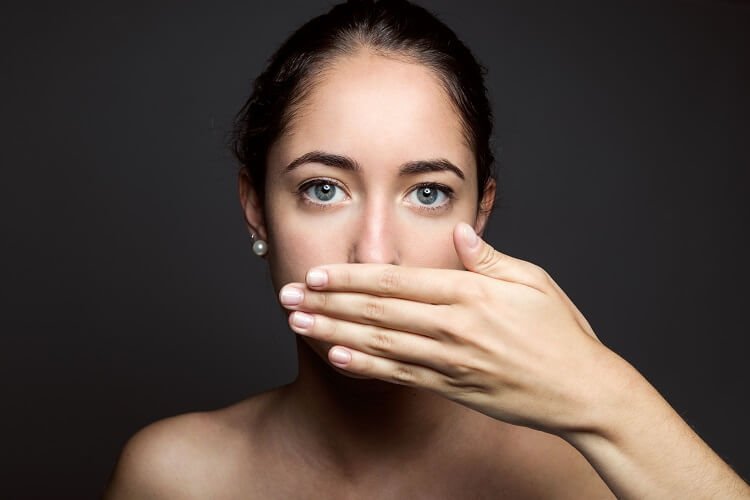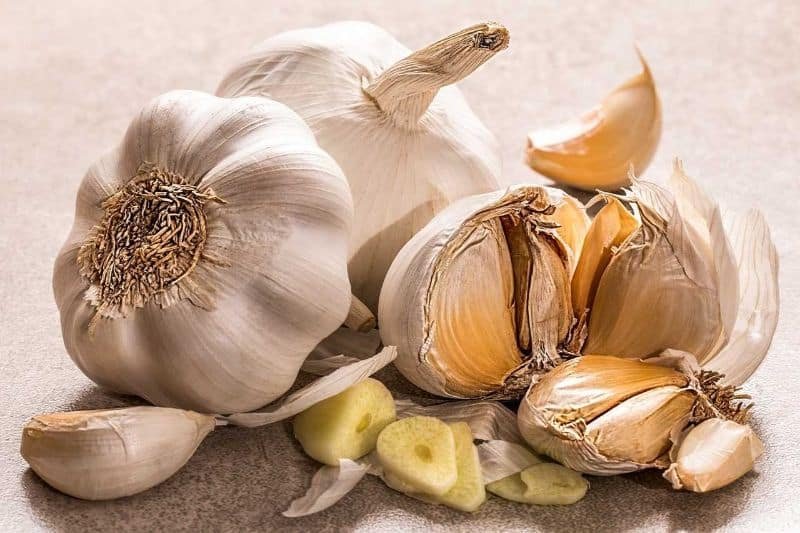What is Halitosis and How To Treat It

In this article, we will examine what is halitosis (bad breath) and how to treat it. We are also going to take a look at which foods cause bad breath.
What is Halitosis (Bad Breath)
Halitosis, i.e. chronic unpleasant breathing, is manifested by a strong unpleasant odor from the mouth. The fairly common morning stench of the mouth is not due to halitosis. The same applies to unpleasant breathing that occurs for a few minutes after eating very spicy and exotic dishes.
The problem of halitosis is the persistent stench of the mouth that is not neutralized even after brushing the teeth, the use of dental floss, and washes with mouthwash. Many people feel embarrassed and ashamed of the problem they face, and often hesitate to report it even to their dentist. However, it is a fairly common problem that can be tackled effectively.

Halitosis is due to several causes, 80% of which are found in the oral cavity. The most common suspects are caries, periodontal diseases, broken fillings, and incomplete cleaning of artificial dentures.
Of course, it can also be due to nutritional factors. High protein/low-carbohydrate diets, acidic foods, sweets, and, of course, the consumption of onion and garlic, certainly reinforce the bad breath of the mouth. The same is true of excessive consumption of coffee and alcohol. The problem becomes even more pronounced if you smoke.
In rare cases, halitosis may be due to lung diseases, certain cancers, and tonsil infections. It may also be associated with hematological diseases or kidney diseases. The most common medical causes, however, are diabetes, due to fluctuations in blood sugar levels, gastroesophageal reflux, and retronasal runny nose. Even simple sinusitis can affect your breathing because of the accumulation of mucus.
Read Also: Reverse Type 2 Diabetes. The Genuine Blood Sugar Solution (opens new website)
Because in most cases the causes of halitosis are due to diseases inside the mouth, the first step you need to take is a reassessment of the technique of brushing your teeth and washing your mouth.
Brushing teeth is necessary, but it is equally important to focus on brushing the tongue, where many bacteria live which causes unpleasant breathing. Brush the tongue, use dental floss, and wash with mouthwash (check these natural mouthwashes).
Do not forget that brushing only cleanses 25% of the mouth. Using oral solution ensures the proper cleaning of the entire mouth.
If you do not notice any improvement, the next step should be a visit to the dentist. Don’t feel afraid or embarrassed to talk about your problem with an experienced professional. He is most likely to diagnose the cause of the problem and suggest appropriate treatment.
Why Your Breath Smells In The Morning?
Have you ever wondered why your breath smells different in the morning when you wake up? It’s because most of the time you sleep, you breathe through your nose.
During the day, air exchange through the mouth is more common and populations of anaerobic bacteria decrease. But at night, their numbers go up. And they produce chemicals, often unstable, that cause the “morning mouth.” When brushing your teeth, remove tiny residues and entire populations of bacteria. Their number decreases and breathing becomes more pleasant. This cycle continues throughout the 24-hour period.
READ ALSO: The Lost Ways 2 Book Review
Germs don’t just cause odors in your mouth. They are found everywhere and especially in some places, such as the armpits and groin, the microbial concentrations are very high. Populations are dominated by microbes that produce particularly smelly products.
Although entire industries have been created to control odors, these are not random. Microbial smells determine who we are. They show who our friends, our relatives, our potential companions are and tell us when it could be a good time to mate. Mothers know the smell of their babies and vice versa. They also determine how attractive we are to mosquitoes. The smell is important and is primarily of microbial etiology.
The Human Microbiome Program
Every space in our mouth has many surfaces, on the tongue, teeth, gums. And each surface has a different population of bacteria than those that usually live in your mouth. Scientists know several things about oral microbes from the five-year Human Microbiome Program (HMP: Human Microbiome Project), launched in 2007 by the National Institutes of Health in the US.
The objective of HMP was a major project to sequence the genetic material of microbes from about 250 healthy young adults. Although the overall inventory of bacteria found showed many similarities between the participants, each was unique. The microbial differences of individuals far outweigh the differences in human genes. Looks like the germs are very personal.
In the HMP study, the mouth was extensively tested. Some families of microbes were found to be common in many places, such as Veillonellas, Streptococci, and Porphyromonas, but their distribution varies widely. Other organizations were present only in a limited area.
The richest zone of microbes in the mouth is between teeth and gums. This area is full of bacteria, many of which are anaerobic (they don’t like oxygen). Anaerobic microbes are killed by oxygen.
It seems contradictory that we host a large population of oxygen-sensitive bacteria in our mouths, from which oxygen-containing air is constantly entering, but it is true. There are special positions, some very small, where anaerobic bacteria can bloom.
Which Foods Cause Bad Breath

Some foods tend to cause bad breath more than others. A diet high in protein and sugar burdens the situation. For example, high consumption of cheese can cause unpleasant breathing, as it contains many proteins.
Other foods to avoid include onions, garlic, cauliflower, cabbage, and Brussels sprouts. These foods have a high concentration of sulfur compounds. They are chemicals similar to those produced by bad breath bacteria.
Foods and beverages such as tomatoes, pineapple, citrus fruits, and coffee contain high levels of acids which cause faster reproduction of bacteria. Coffee contains high levels of acids that accelerate the growth of bacteria. This creates a bitter taste in the mouth and then leads to bad breath.
Coffee is also a diuretic that can cause dehydration and dry in the mouth. Milk in coffee aggravates the situation because it contains sugars.
Alcohol can also cause dehydration resulting in unpleasant breathing.
READ ALSO: 40+ Foods To Eat To Live Longer, Healthier & Happier
How To Treat Halitosis
A proper oral hygiene routine includes brushing, dental floss, dental solution, tongue cleaning, and regular visits to the dentist.
Drink 6-8 glasses of water a day to make up for saliva. The use of oral solution without alcohol reduces oral bacteria. Check these best oral solutions without alcohol. Sugar-free gum could also contribute to saliva production.
There are several ways to treat bad breath.
- Brush the teeth every time after eating and use dental floss regularly. The thread is important because it reaches between the teeth where toothbrushes cannot reach.
- Avoid smoking, quickly dry the mouth, and introduce nicotine and tar into the teeth which helps to create an even more unpleasant odor.
- Use an alcohol-free mouthwash. The best time of use is before bedtime.
- For a clean tongue use a tongue scraper or toothbrush and gently apply some natural mint toothpaste to the surface of the tongue. This will help remove waste and odor from bacteria that live deep in the nipples of the tongue while soothing irritation of the tongue.
- Stop eating sugar which feeds the bacteria.
- Some foods are thought to be able to combat unpleasant breathing. For example, parsley containing chlorophyll, a compound with antimicrobial properties, can break down sulfur compounds that cause bad breath. It still contains polyphenols that break down the fragrant sulfur compounds in the mouth. Apples and spinach also contain polyphenols.
- Sugar-free probiotic yogurt can reduce bad breath. Probiotic bacteria such as lactobacillus bulgaricus and streptococcus thermophilus, compete with bacteria that contribute to bad mouth breathing.
Note that one cause for halitosis may be the lack of zinc. Some oral washing products contain zinc as an active ingredient because the metal is antimicrobial. Zinc helps maintain a clean, bacteria-free mouth.
If you enjoyed our article on What is halitosis and how to treat halitosis, consider sharing it with the rest of the world. It means a lot to us.
featured image by nensuria – www.freepik.com
